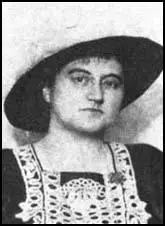Rosika Schwimmer

Rosika Schwimmer was born into a Jewish family in Budapest, Austria-Hungary, on 11th September, 1877. While working as a bookkeeper in Budapest she helped establish the National Association of Women Office Workers and served as its president between 1897 and 1912.
Rosika Schwimmer was active in the campaign for women's suffrage in Austria-Hungary and in 1913 was elected as corresponding secretary of the International Woman Suffrage Alliance (IWSA). Schwimmer and Carrie Chapman Catt, the president of the IWSA, went on a successful speaking tour of Eastern Europe. The following year, Schwimmer, who spoke nine languages, moved to London to serve as IWSA's press secretary.
On the outbreak of the First World War Schwimmer, a pacifist, decided not to return to Austria-Hungary. In 1914 she travelled to the United States where she had meetings with President Woodrow Wilson and his Secretary of State, William Jennings Bryan, and urged them to use their influence to bring the war to an end.
In January, 1915, Rosika Schwimmer joined with other pacifists to form the Woman's Peace Party. Schwimmer's close friend, Jane Addams, was elected chairman and other women involved in the organization includedMary McDowell, Florence Kelley, Alice Hamilton, Anna Howard Shaw, Belle La Follette, Fanny Garrison Villard, Emily Balch, Jeanette Rankin, Lillian Wald, Edith Abbott, Grace Abbott, Crystal Eastman, Carrie Chapman Catt, Emily Bach, and Sophonisba Breckinridge.
In April 1915, Arletta Jacobs, a suffragist in Holland, invited members of the Woman's Peace Party to an International Congress of Women in the Hague. Jane Addams was asked to chair the meeting and Alice Hamilton, Grace Abbott and Emily Bach went as delegates from the United States. Schwimmer represented Austria-Hungary and others who went to the Hague included Lida Gustava Heymann (Germany); Emmeline Pethick-Lawrence, Emily Hobhouse, (England); Chrystal Macmillan (Scotland).
After the meeting in Holland, Schwimmer, Jane Addams, Chrystal Macmillan and Emily Bach went to London, Berlin, Vienna, Budapest, Rome, Berne and Paris to speak with members of the various governments in Europe in an attempt to bring the war to an end.
Rosika Schwimmer joined three other anti-war campaigners, Jane Addams, Oswald Garrison Villard, and Paul Kellogg to meet Henry Ford, the wealthy American businessman, and suggested he should sponsor an international conference in Stockholm to discuss ways that the conflict could be brought to an end.
Ford came up with the idea of sending a boat of pacifists to Europe to see if they could negotiate an agreement that would end the war. He chartered the ship Oskar II, and it sailed from Hoboken, New Jersey on 4th December, 1915. The Ford Peace Ship reached Stockholm in January, 1916, and a conference was organized with representatives from Denmark, Holland, Norway, Sweden and the United States. However, unable to persuade representatives from the warring nations to take part, the conference was unable to negotiate an Armistice.
Rosika Schwimmer became vice-president of the Women's International League for Peace and Freedom. After the Armistice Schwimmer became a member of the new Hungarian government. She was Hungarian minister to Switzerland until the prime minister, Mihaly Karolyi was ousted in 1919. The fascist regime of Nicolas Horthy began to purge Jews from positions of authority and Schwimmer had to be smuggled out of Hungary. She moved to Austria and in 1921 decided to emigrate to the United States.
At this time the United States was experiencing a Red Scare. As a result of her anti-war activities, Schwimmer was denounced as a dangerous radical. Her application for citizenship was denied when she refused to affirm that she would bear arms in time of war. She appealed but the judgement was confirmed by the Supreme Court in 1929.
Rosika Schwimmer was allowed to remain in the United States and helped form the Campaign for World Government. In 1935 she joined with Mary Ritter Beard to create the World Centre for Women's Archives. The main objective for the centre was to preserve the records of women's contributions to history. They chose the motto for the archive: "No documents, no history." The venture was brought to an end in 1940 as a result of her failure to raise enough funds to pay for the centre.
Rosika Schwimmer died of bronchial pneumonia in New York on 3rd August, 1948.

